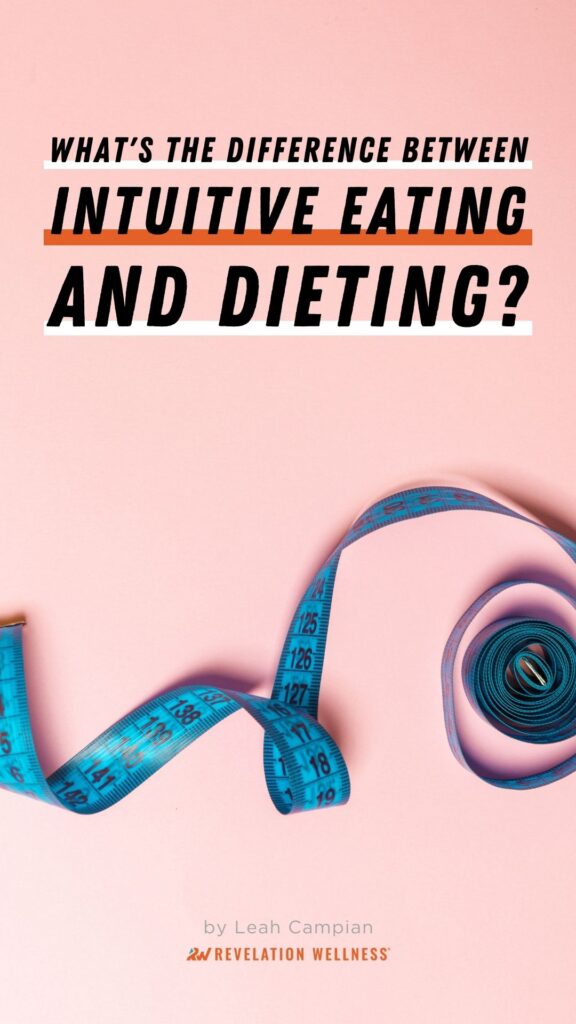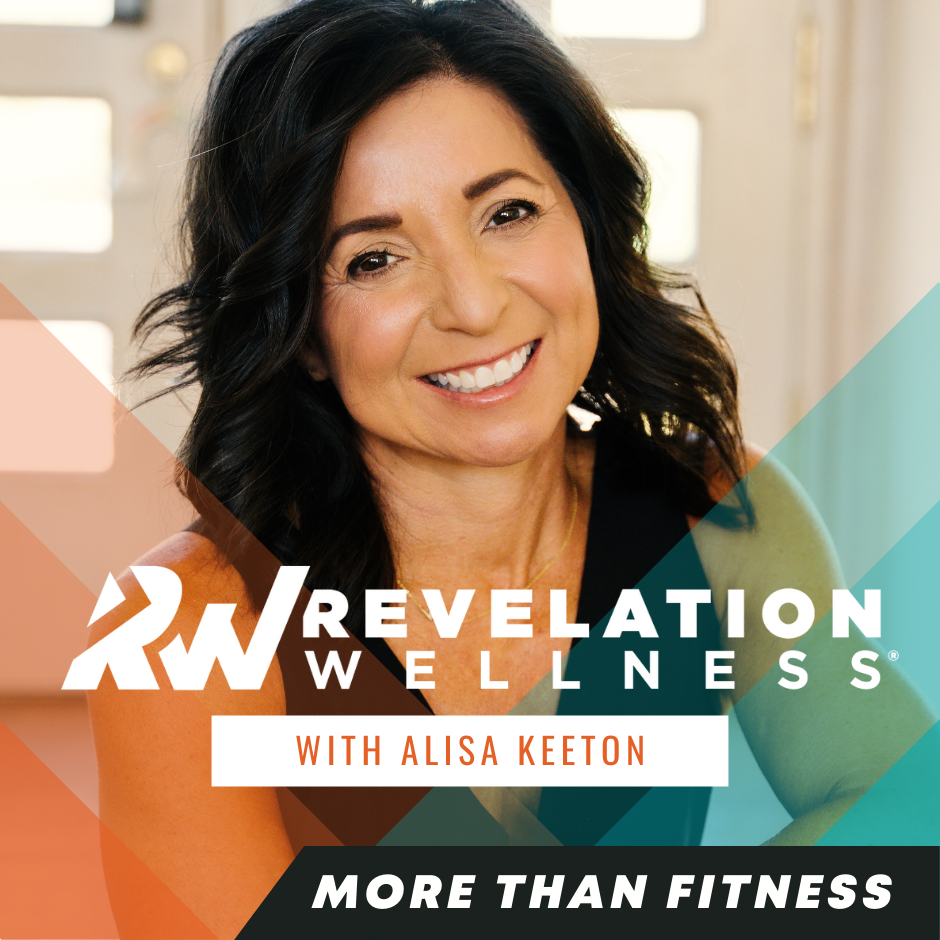Leah Campian shares how you can find food freedom with Intuitive Eating.

Dieting vs. Intuitive Eating
External Cues | Internal Cues
One-size-fits-all | Individualized
Rigid & Stringent | Flexible & ever-changing
Cause stress & anxiety | Eating is a pleasurable experience
Food is the enemy | Food is a gift from God
Physiological Focus | Whole-Person Approach
Promote self-hate | Promote self-compassion
Temporary success | Permanent reward
External vs. Internal Cues
What is the difference between intuitive eating and dieting?
The main difference between the two is that dieting uses external cues and measures from another “expert.” In contrast, intuitive eating (IE) uses God-given internal cues and measures, relying on the individual as the expert on their own body.
Dieting extracts one or a very select few parts of nutrition to focus on (calories, macronutrients), restricting foods that go outside of the prescribed boundaries by controlling the quantity of food or excluding certain foods or food groups.
In contrast, IE looks at food as information for the body, attuning one’s awareness of its impact on the person’s body, both immediate and long-term.
It’s important to note that an intuitive eater doesn’t have to throw out external knowledge or ignore food facts (what we know and understand from science). Rather, we use that information to shed light on our own experiences with food. This self-study through testing and observation is part of becoming an expert.
Intuitive Eating Offers Freedom
Diets are one-size-fits-all, whereas IE is more individualized.
Diets present themselves like recipes to follow. Eat this, don’t eat that, and obtain these results. Yet, even the most diligent dieters come out on the other side with little to no results and an even more damaged relationship to food.
If this sounds like you, let me encourage you: It’s NOT YOUR FAULT!
Each individual is unique, with a distinct DNA, and differently affected by their environment, life experiences, emotions, mindset, etc.
Health (and one’s way of eating) is bio-individual, in that what might work for me may not work for you; thus, nutrition should be individualized.
Diets are rigid and stringent, while IE is flexible and ever-changing.
In some ways, we might prefer dieting because there are clear guidelines and boundaries. Everything is black and white and there’s nothing to figure out.
IE offers freedom.
If we’re willing to put in the effort and thoughtfulness to connect our minds to our bodies, we can create a feedback loop informing us of the most beneficial foods, times, and ways to eat for the most positive impact on our health.
That’s why we shouldn’t mistakenly assume that IE doesn’t require self-control. It requires discipline and patience to become attuned to our body’s cues and honor the body by adjusting our behaviors to the information it’s giving us, even changing our thoughts and mindset about food and eating.
The Intuitive Eating approach involves going all the way back to God’s perfect design by understanding and honoring things like hunger and satiety cues, cravings, fatigue, emotions, physical pain, discomfort, etc.
In God’s wisdom, He created our bodies with various mechanisms through which we receive feedback so we can form habits and make adjustments to care for ourselves and live abundantly to love Him and others well.
IE allows us to see all food as a gift from God to be enjoyed, as an opportunity to nourish our bodies, God’s temple, keeping it fit for use in His Kingdom, a living sacrifice for His glory.
Leah Campián
Food Is A Gift From God
Is anyone really happy when they’re on a restrictive calorie diet? Does labeling food as “good” or “bad” really serve anyone?
While dieting often lands us a job as the “food police,” intuitive eating invites us to enjoy food as God intended.
While food is neither inherently good nor bad, foods can be beneficial or detrimental to our health. This doesn’t mean one bad meal puts us on the path to destruction. Instead, our eating patterns over time ultimately determine our health, along with many other gene and lifestyle factors.
IE allows us to see all food as a gift from God to be enjoyed, as an opportunity to nourish our bodies, God’s temple, keeping it fit for use in His Kingdom, a living sacrifice for His glory.
The beauty of this individualized approach is the understanding that one person’s medicine may be another’s poison.
Because we are found in Christ, we are free to make decisions out of love that helps us flourish, rather than acting out of fear, which causes us to shrink back and play smaller than our God-created potential.
A Whole-Person Approach
Diets are solely physiological, focusing only on the body and food, whereas IE involves the mind, body, and emotions.
While dieting is only concerned with what is eaten, IE also focuses on the way you eat, encouraging mindful eating. It goes beyond physical hunger and explores other things we might be hungry for, how our emotions play a role in this, how food can in turn serve as a comforter, even becoming an addiction, and ways to nourish ourselves beyond food.
As Christians, IE can make us aware of our tendency to turn to food to fill our needs instead of God.
While diets can promote self-hate, IE can encourage self-compassion and self-love.
Diets can feel restrictive, depriving, depleting, and draining. IE can be an opportunity to explore and discover how different foods in different quantities, times of the day, stages of life, and varying hormone levels and moods affect one’s whole being. It can be energizing and focus on what you’re gaining, what you “get to” enjoy rather than what you “have to” give up.
Diets might end with a temporary successful outcome, but IE is intended to be permanently rewarding.
Learning the skill of intuitive eating is an opportunity to partner with the Holy Spirit to guide and direct our decisions, honor God’s perfect design of our intricate and wonderfully made bodies, and reconnect our bodies to our minds and spirits.

Leah Campián is the author of Amazon best-seller, Ditch the Diet: How Your Frustration Can Lead to Freedom and Permanent Weight Loss and has used intuitive eating to lose weight after years of yo-yo dieting. As a Certified Transformational Nutrition Coach, Certified Culinary Nutrition Expert, and Platoon 25 Certified Rev Well Instructor, Leah creates programs and coaches clients through common hang-ups that diet culture ignores, like emotional eating, cravings, and food addiction, while teaching them the skills of intuitive health. To learn more, visit her website.

Wholehearted Approach to Eating
Intuitive Eating has been a well-researched approach to eating since 1995. In contrast to the low-calorie, low-carb diet fads of the day, the founders of Intuitive Eating, Tribole and Resch, wanted to share an approach to food that included all food groups and even invited you to enjoy the foods you were eating. This whole-body health approach to food was revolutionary, and it’s still making waves today.
If you’re tired of dieting and you want to enjoy the body God designed, Intuitive Eating might be for you! The Christian’s Guide to Intuitive Eating: Trusting God With Your Food will answer all your questions about Intuitive Eating, from “What is it?” to “Can I lose weight with Intuitive Eating?”
Learn more about Intuitive Eating:















